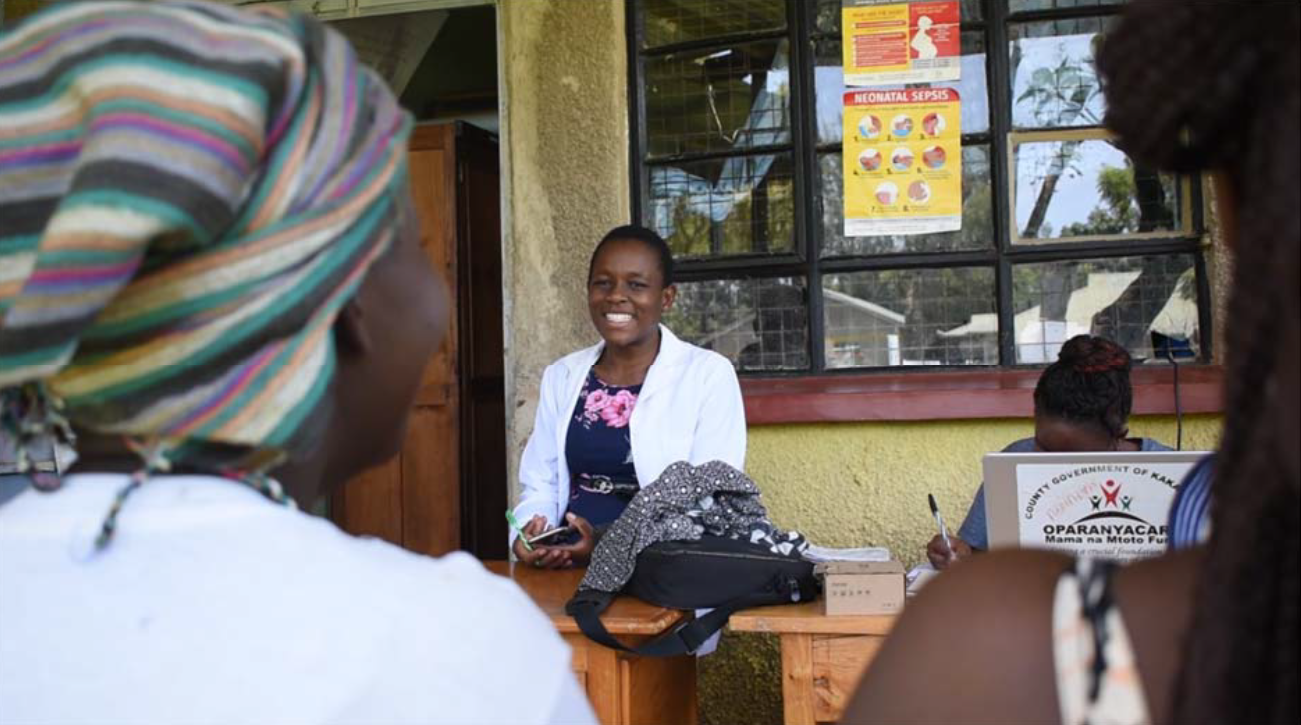
Fighting Malaria During Pregnancy
With a light smile, Susan (not her real name) from Matungu sub-County in Kaka-mage County, openly celebrates with joy the fact that she is assured that neither she nor her unborn child will be harmed by Malaria. Susan, 39, who attends her ante-natal care at Matungu sub-County Hospital, has taken the path to re-write the ending of an infamous script of deaths by malaria to mothers and children.
“I come to Matungu hospital to take my malaria tablets on my scheduled dates. The community health workers have educated me on the importance of taking them. Most important is that I have never missed because every time the drugs are available,” said a confident Susan.
Susan, who presented as a peasant farmer to the USAID Afya Ugavi Activity (herein referred to as Activity) documentation team, is the face of thousands of women who have the desire to have access to and utilize healthcare services from healthcare workers at government facilities. They have hopped to get attention from various healthcare providers.
“When I come to the hospital, my weight is taken, my pressure is checked, and I have an opportunity to talk to the nutritionist. However, I cannot imagine leaving hospital minus taking the malaria drugs,” Sarah said.
In the past, patients would be seen in hospital and find their way to get drugs else-where, or never get at all. This narrative has since changed, with the thousands of women receiving Malarial drugs at Matun-gu sub-County hospital.
“I like the system. It is not only about giving us malaria tablets but the consistent follow-up by community health workers that gives me the feeling that Matungu hospital cares for my life and that of my unborn child. The community health workers also find out how we faired on with the drugs,” she added.
According to the World Malaria Report, in 2018, the African region had the largest burden of malaria morbidity, with 213 million cases, that is, 93% of the global cases. In Kenya, the Activity provides technical assistance in supply chain management at the national level. At the county, the Activity has a focus on the eight lake endemic counties with the greatest malaria burden – Busia, Bungoma, Kakamega, Vihiga, Kisumu, Siaya, Homa Bay, and Migori. With such a mammoth of humanity to take care of, the hospital has engaged community health workers to check on the performance of mothers on Malaria drugs, reporting any misnomer and negative drug reactions.
“I feel important when my feelings about the drugs are relayed to the doctors at Matungu. I have trusted the system,” said Susan.
As of February 2020, all the 1,620 women who attended ANC Clinics received malarial drugs. With a population of 11,431 as women of childbearing age, Matungu sub-County hospital is setting precedence in being the preferred place for healthcare.
Susan’s Support System for Drug Supply at Matungu
Susan’s narrative is anchored on appreciating healthcare professionals involved in her current journey to new motherhood. At the interview, Susan appreciated the Matungu staff “…this hospital never misses the Malaria drugs. There must be something special about the team…” which alluded to the fact that Activity has strengthened the supply chain systems to ensure health products and medical supplies are available at the point of care.
The fact that 100% of 1,620 women receive Malaria drugs without a gap in supply, Matungu sub-county Hospital has achieved high standards in ensuring that the people who are managing health commodities have the appropriate skills to do demand and supply planning, can manage commodities to minimize wastage, and engage in the rational use of medicines.
“All women who are my friends have said the same thing, they like the commitment by facility staff. We get our drugs as scheduled – I mean, I have never missed, and that is true to my friends,” Sarah alluded to elements of data use by the facility, and the complexities and importance of supply chain management to the various stakeholders that impact Kenya’s health system. She added, “I thank whoever is ensuring the good job continues, because without them, then most of us will be in trouble”
In Kenya, the Activity has provided a platform for the actors within Kenya’s health supply chain to use data for decision-making. The project does this by creating governance structures, such as technical working groups within county health management teams, and new tools such as an integrated data dashboard for commodity reporting and management. Supply chain management is a vital component of strong and sustainable health systems.
In addition, Matungu has seamlessly planned the supply chain process to ensure the availability of funds to procure the drugs and proper quantification of required drugs. These factors have enabled the health facility to quantify their requirements and make timely orders.
Sustaining the Journey minus Malaria for Sarah’s Future
“I hope that malaria drugs will be available in the future. You never know I could be back after a while seeking for them,” said Sarah in a joking manner.
Sarah speaks to the Journey to Self-Reliance, the USAID concept that aims at fostering sustainability and ensure that provision of malaria tablets continue in the focus counties after the transitioning-out of the Activity. The documentation team made attempts to make Sarah aware that her thoughts we in line with that of everyone else giving her pregnancy care. Specifically, Sarah was informed of Kakamega County’s intent to create an organ to ensure her malaria drugs kept flowing.
The establishment of a Health Products and Technologies Unit at Kakamega County, as mandated in the Health Policy for 2017, will be an achievement towards improving and sustaining the commodity supply chain. The Unit will take up the functions of organizing, monitoring, and supporting all activities within the supply chain system.
The Unit will also be accountable to Sarah through social accountability, by providing progress and feedback on the performance of the supply chain process in Matungu.